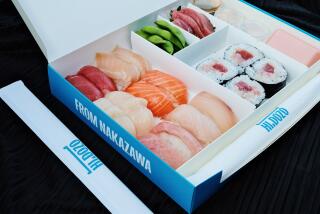Federal Express Hits Slow Lane : Red Tape in Japan Causes Firm Frustrating Delays in Deliveries
- Share via
Federal Express is not happy with its delivery time to Japan.
The three days it takes for a package from the United States to reach its destination in Japan is the longest for any of the 100 foreign countries that Federal Express serves. The Memphis, Tenn., company normally delivers packages to other foreign destinations in two days.
The extra day for Japan is necessary because Federal Express must transport packages from Narita Airport where they arrive to a customs clearance center at Baraki Airport, 40 miles away. Federal Express recently was designated as the sole U.S. carrier to operate an express, small package service between Japan and the United States.
Japan is supposed to provide expedited customs clearance for Federal Express under terms of the U.S.-Japan air transport agreement, according to A. Doyle Cloud, the company’s vice president for government and regulatory affairs. “The Japanese government has not fulfilled its obligation in that regard,” he said.
Yoshio Isomura, first secretary in the finance section at the Japanese Embassy in Washington, said the Japanese government has made an effort to improve and shorten the customs clearance time.
The clearance time for small packages is one day or less, compared to 1 1/2 to 2 days for regular air cargo, he explained, adding that most air cargo is cleared through customs at Baraki Airport because Narita is too small.
The customs delay, however, is just one obstacle that the U.S. carrier has faced since receiving approval last year to fly its own aircraft into Tokyo. In addition, the Japanese government and freight forwarders as well as U.S. air cargo companies such as Flying Tiger have raised objections that Federal Express is carrying more than just small packages. Federal Express has been sending packages into Japan for the past three years but on other carriers.
Not Totally Surprised
The Japanese government first raised objections just a few weeks before Federal Express’ inaugural flight, originally scheduled for May 12, 1988. It said Federal Express’ documentation for the small packages was not acceptable because it did not conform to the longer, more detailed traditional airway bills used for air cargo. In addition, the government challenged Federal Express’ right to transport an unlimited number of 70-pound packages.
“It’s not unexpected in this sort of situation to have a misunderstanding. . . . This was a new game for them as well as us,” Cloud said. “It was frustrating to have a roadblock appear late in the game, but we were not totally surprised by it. . . . Japan is one of the few industrialized countries that continues to disallow open air cargo transportation.”
Federal Express is putting up with such headaches because the U.S.-Tokyo route “is now one of the largest and one of the fastest-growing air cargo markets in the world,” Cloud explained.
In the first quarter of 1988, according to the Commerce Department, total U.S.-Japan international air trade traffic, based on tonnage, was up 55% from last year, while U.S. air cargo trade worldwide rose only 20% during the same period. In 1987, U.S.-Japan air trade was up 29.1%, compared to 12.4% for total U.S. international airborne trade, according to the Commerce Department.
Japanese officials also objected to Federal Express’ plans to ship packages larger than 70 pounds but less than 150 pounds through Tokyo to other Asian cities or from Asia to U.S. points. Since the ultimate destinations of such packages were beyond Japan, Federal Express said they were exempt from the Japanese 70-pound rule.
Japanese Helpful
Cloud said Japan said no, relying on an antiquated theory that once a package lands on the soil of a given country that item originates in that country even though it is passing through to another destination. “It is a fiction that is basically ridiculous.”
Although these points were not resolved, Federal Express finally took off on June 16 and now operates flights between Tokyo and Portland, Ore., four times a week. “We are not experiencing any holdup due to paper work or weight,” said John M. Dauernheim, vice president, Pacific Region, for Federal Express.
He said Japanese customs are helpful and cooperative, but “we’re saying that our packages need to be cleared at Narita when they arrive, similar to what happens in the U.S.”
Dauernheim estimated that about 60% of packages entering Japan must go through customs. Items run the gamut from foodstuffs to computer and auto parts to hospital supplies and medicines. The rest are documents, interoffice correspondence and banking papers, which do not have to clear customs.
Meanwhile, Dauernheim said, “Business has met expectations. We’re very pleased with traffic, especially out of Japan.”
But controversy continues to dog Federal Express as its Japanese and U.S. competitors contend that many of the company’s shipments are not small packages.
Last month, for example, Federal Express shipped 100,000 pounds of Washington cherries a day to Tokyo for 10 days. The fruit was packaged in 30-pound crates, each with its own paper work or airway bill. Federal Express had brokers on hand in Tokyo to help expedite customs clearances.
More to Read
Sign up for Essential California
The most important California stories and recommendations in your inbox every morning.
You may occasionally receive promotional content from the Los Angeles Times.










